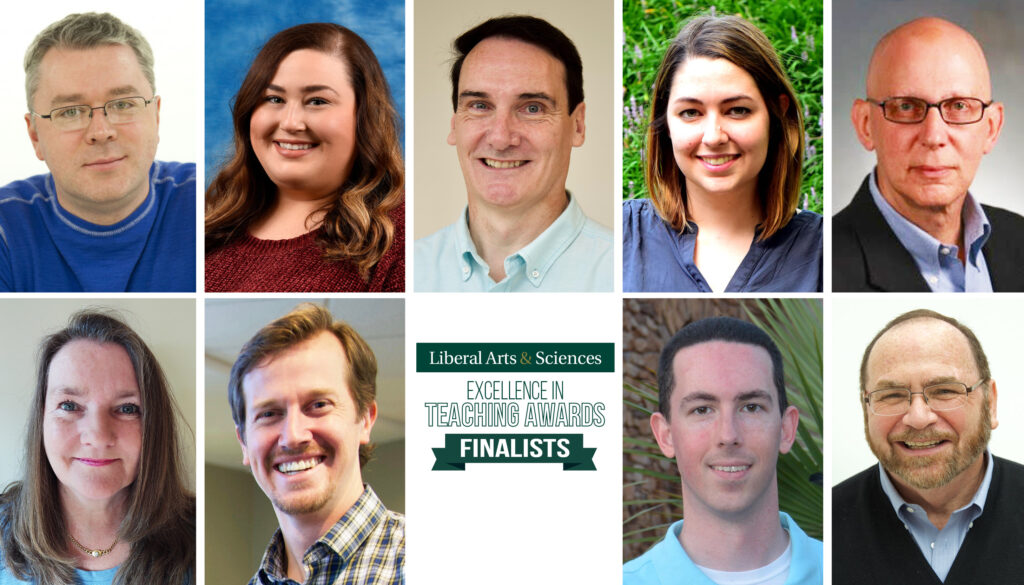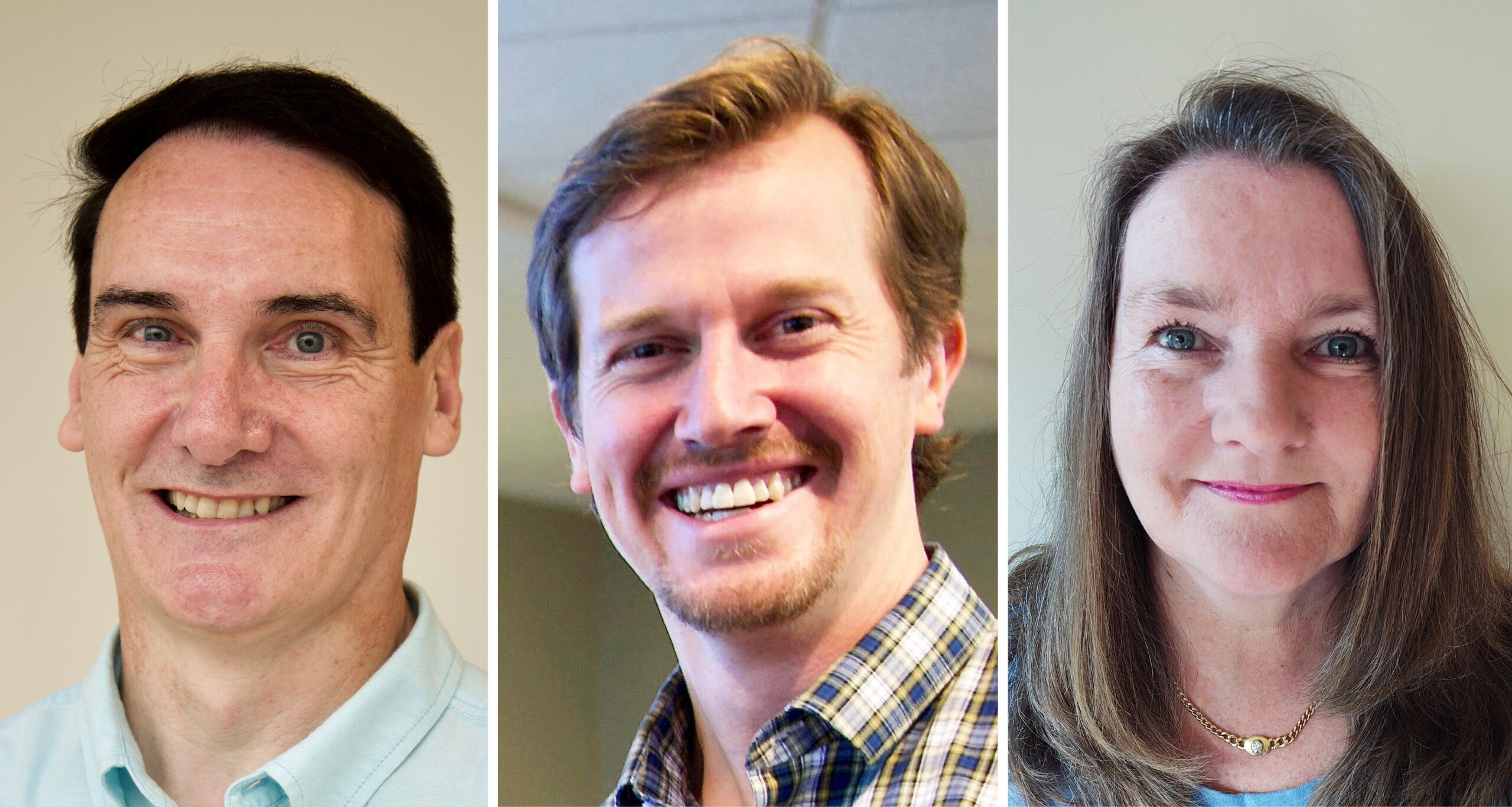In recognition of their exceptional teaching and abilities to connect with students, Didier Dréau, Andrew Goff and Angela Jakeway have received the College of Liberal Arts & Sciences Excellence in Teaching Awards for the 2019-2020 academic year.
Dréau, an associate professor in the Department of Biological Sciences, received the Integration of Undergraduate Teaching and Research Award. Goff, an adjunct faculty member in the Department of Biological Sciences, received the Outstanding Teaching by a Part-Time Faculty Member Award. Jakeway, a lecturer of German in the Department of Languages and Culture Studies, received the Outstanding Teaching by a Full-Time Lecturer Award.
They received their awards earlier in May during a virtual celebration designed to comply with social distancing measures in response to COVID-19. Over 100 guests attended the online ceremony to celebrate the nine finalists.
Creating connections makes the difference in student learning, said College Dean Nancy A. Gutierrez.
“This intellectual and sometimes emotional connection that takes place is the space in which learning occurs,” Gutierrez said. “It is clear when you hear about the teaching accomplishments of our finalists today that they excel exactly because they have successfully identified strategies that allow meaningful connections whether virtually or otherwise.”

Integration of Undergraduate Teaching and Research Award
The recipient of the Integration of Undergraduate Teaching and Research Award, Dréau has effectively coupled his extensive research on the tumor microenvironment with his teaching. The awards committee was especially impressed by his long history of working directly with undergraduate and graduate students on a wide range of research experiences, inside and outside of the classroom. He has mentored over 70 undergraduate students, 20 Honors students, and 13 graduate students, and has been a member of over 50 Honors thesis committees and over 60 graduate thesis committees.
Alumnus Seth Flynn said Dréau helped him see research as more than a means to an end, but, rather, as an opportunity for interest-guided exploration and scientific advancement.
“I am so thankful for his encouraging nudges in that direction – his hands-on mentorship and the skills I learned both in his laboratory and classroom greatly influenced my decision to choose Duke School of Medicine, where I will have the unique ability to complete an entire year of basic science research,” Flynn said.
With $1.7 million in extramural funding, Dréau has engaged students in a variety of his projects. He also has collaborated with fellow faculty, and graduate and undergraduate students to present at 95 international, national, and local research conferences.
The National Science Foundation funded his Emerging Frontiers in Research and Innovation project that aimed to generate three-dimensional models of breast tissue in vitro. With this project, underrepresented and first-generation undergraduate students gained an introduction to hands-on research, most of whom went on to further training and successful careers as graduate students, medical school students, or professional scientists. These efforts earned him the UNC Charlotte Outstanding Faculty Award from the Office of Multicultural Academic Services (now the Office of Academic Diversity and Inclusion) in 2014.
Integration of Undergraduate Teaching and Research Award Finalists
Finalists for the award were Kirill Afonin, an associate professor in the Department of Chemistry, and Alan Rauch, a professor in the Department of English.
Afonin is emerging as an internationally-known investigator in the field of RNA nanotechnology, and has attracted major external grant funding to support research, including a $1.4 million grant from the National Institutes of Health (NIH), plus numerous other grants as principal investigator or co-PI. Many of his over 20 academic papers have included undergraduate students as coauthors. Afonin has developed and taught courses with research experiences, including an undergraduate independent research course, “NanoBioChemistry.” Afonin has also developed “ouRNAno”, a YouTube channel that provides tutorials on lab standard protocols and procedures.
Rauch integrates his training as a scientist with his literary scholarship, with a bachelor’s degree in biology, master’s degrees in zoology and English literature, and a doctoral degree in English literature. Rauch has developed a number of courses that integrate the sciences and the humanities. As one example, he developed a course, The History of the Book: From Print to Pixel, that combines challenging readings with practical introductions to paper making, printing, binding, bookselling, reading practices, and digital media. A laboratory component provides the opportunity to learn printing techniques and create letterpress materials, combining literature, art and chemistry.
Outstanding Teaching by a Part-Time Faculty Member Award
The recipient of the Outstanding Teaching by a Part-Time Faculty Member Award, Goff is an adjunct faculty member in the Department of Biological Sciences who sees one of the most important ways to help students is by being accessible.
“As an educator, I strive to be the person that my students will approach with questions when seeking guidance during their academic careers,” Goff said. “By making myself approachable to my students, I can have an honest dialogue with them regarding their study habits and preparation for lectures and exams. Through these seemingly simple interactions, I hope to impact each of my students in a way that fosters a lasting approach to understanding, appreciating and respecting the biology and science in the world around them.”
Students commend Goff for his enthusiasm and innovative teaching. “I greatly enjoyed this class,” one student wrote. “Professor Goff had great energy and passion towards biology that he brought with him to every class. This enthusiasm definitely helped to bring the material alive and made the overall class more interesting.”
Goff uses classroom polling and response-type activities to gauge students’ understanding and retention of the material, and uses nature documentaries in his lectures to demonstrate scientific concepts. He hosts creek clean-ups each semester with students and the Charlotte Mecklenburg Storm Water Services. The work of a volunteer student group he founded, UNCC Trashtaggers, has been recognized in the community, including a nomination for the 2020 Governor’s Volunteer Service Award.
He earned a master’s degree in Marine Biology at UNC Wilmington and worked as an environmental toxicology researcher for a year, before joining the department in 2017. Past work with the Nature Conservancy and the National Oceanographic Centre, and his research experiences help him guide students in collaborative research projects.
Part-Time Faculty Award Finalists
Finalists for the award were Henry Doss, a part-time instructor in the Department of English, and Evan Nooe, a part-time instructor in the American Studies Program.
Doss brings a lifetime of professional achievements to the classroom, with over 35 years in banking, venture capital, and consulting. Doss earned a master’s degree in liberal arts and a bachelor’s degree in English from UNC Charlotte. He is noted for encouraging students to gain practical and philosophical insights into the value of their college education, especially among students earning humanities degrees. His teaching philosophy is centered around the two key principles of respect and self-learning. Colleagues commend him for bringing to the classroom compassion, enthusiasm for the humanities, generosity, good humor, and commitment to students.
Nooe has developed courses for the American Studies Program that give students an in-depth look at the history and culture of the American South. Class assignments incorporate experiential learning opportunities ranging from face-to-face exhibit tours and discussions at the Levine Museum of the New South, to analyses of digital content of popular plantation tourist destinations, to a study of Charlotte-area restaurants to connect them with Charlotte’s history and foodscapes. To make topics accessible to students, he uses technology, varied media including podcasts and films, collaborative work groups, writing workshops, and peer-editing roundtables.
Outstanding Teaching by a Full-Time Lecturer Award
The recipient of the Outstanding Teaching by a Full-Time Lecturer Award, Jakeway has played a key role in developing the German curriculum and building relationships with German majors and minors. Drawing from her undergraduate degree in finance and several years of work in banking, she initiated the German business certificate program, creating five advanced level courses.
She currently directs the program and exposes students to a variety of opportunities, including paid internship placements in Germany. She invites German business professionals to her classes as guest speakers and organizes visits to regional German companies. She is faculty advisor for all German majors and minors.
The judges noted that she seeks to create a positive, welcoming relationship between her students and the German language by encouraging them to experiment with the language, talk about themselves in German, and she uses hands-on problem-solving activities to reinforce their learning.
Jakeway recalls one teacher from her childhood who told her she would never learn English. That teacher inspired her to teach in an engaged, supportive way. “I love teaching,” she said. “Unlike the teacher I had as a child, I am dedicated to providing a positive learning experience for all students no matter where they are in their educational journey.”
Students often recognize her in the UNC Charlotte Senior Survey as the person at UNC Charlotte who has made the most significant, positive contribution to their education. “The German department and Professor Jakeway have my most sincere thanks and utmost gratitude for properly equipping me to begin my international career at Daimler,” one student wrote in a letter to Chancellor Philip Dubois. “Professor Jakeway is one of the most genuine, caring, and hands-on professors I’ve had, along with the entire German department. Thanks to many professors like Frau Jakeway, our school is and will continue to be a top destination around the country.”
Full-Time Lecturer Awards Finalists
Finalists for the award were Rebecca Agosta, a lecturer in the Department of Writing, Rhetoric and Digital Studies and director of the Writing Resources Center, and Sarah Wells, a lecturer in the Department of Chemistry.
Agosta teaches first-year writing courses and tutors and mentors undergraduate and graduate student writing tutor. She supervises work with faculty writers, and she assists in delivering the course “Topics in Writing and Reading: Writing Partnerships: Texts, Contexts, and Collaboration,” which determines how future graduate and undergraduate tutors will teach other students. She uses peer workshops in the classroom where students become each other’s sounding boards and questioners. Students in the writing center course find themselves in a constant space of collaboration. Agosta designs her curriculum on the philosophy that writing is social and rhetorical.
Wells teaches chemistry courses that students may find intimidating or not related directly to their career plans, leading her to redesign portions of her courses to foster student success. She encourages peer-to-peer instruction and interactions through in- and out-of-class group work and discussion boards. She engages students in problem solving through polling technologies and exercises in which students are immediately asked to apply what was just discussed. She encourages students to participate in priming exercises where they answer a few pre-class questions based on their reading so they are ready to engage in the active problem solving activities during class.








